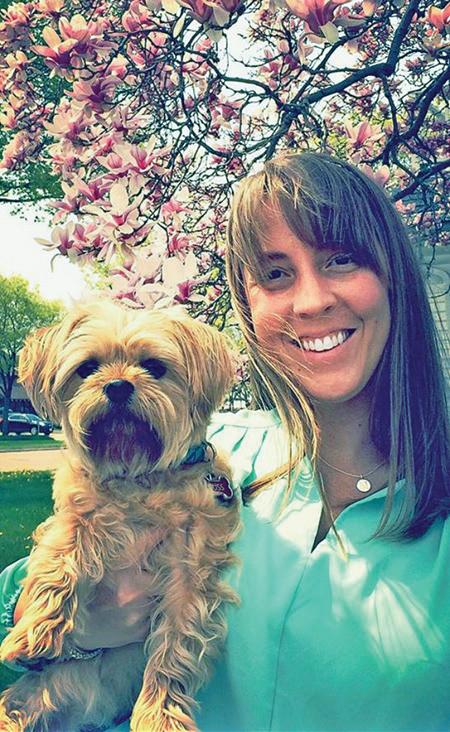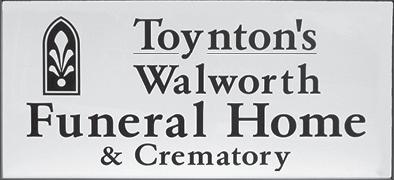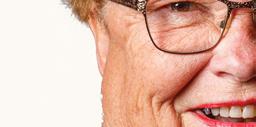Thank you, nurses!
HONORING HEALTH-CARE WORKERS ON THE FRONTLINE



















A nursing shortage in the United States is expected to intensify in the coming years as the aging population grows and the need for health care increases as well.
Projections from the U.S. Bureau of Labor Statistics suggest there will be more than 203,000 openings for registered nurses each year between 2021 and 2031.
And it’s not just a shortage of RNs that the health care industry will be forced to confront.
The BLS’ Occupation Outlook Handbook also projects a growing demand for advanced practice registered nurses, with estimates suggesting as many as 30,200 APRN openings each year between now and 2031.

Qualifications to become an APRN typically include completion of a master’s or even doctoral program, while RNs typically must complete a four-year bachelor’s or two-year associate’s program.
(METRO CREATIVE)
The stress associated with the nursing profession has been well documented. A 2022 study published in the journal BMC Nursing found that job stress not only has an adverse effect on nurses’ health, but also may reduce performance and quality of care, potentially affecting the outcome of patients.
There’s no denying nurses have a lot of weight on their shoulders. That reality underscores the importance of letting nurses know how much they’re appreciated. Community leaders can consider these ideas as they look for ways to honor local nurses.

Parades, high school sporting events, holiday tree lighting ceremonies, and other community-centric events draw large crowds. That makes these events the perfect time to honor local nurses and emphasize all the work they do to help their neighbors.
Ask a local nurse or two to serve as grand marshal(s) in a holiday parade and/or let local nurses flip the switch at a tree lighting ceremony. Community dignitaries like a mayor or local police chief can explain who the honoree is once the crowd gathers.
A community-wide campaign to support a charity that benefits nurses or causes important to nurses can be a great way to thank them for all they do. Various domestic
and international organizations are linked to the nursing profession. Prior to introducing a campaign, community leaders can speak with local nurses to see if there is any specific charity or cause important to them. Some charities may provide job training in communities where nursing shortages have made it hard for locals to access quality health care, while others may finance health care operations, including staffing of nurses, in underprivileged countries.
Publicize and support efforts to improve on-the-job safety for nurses. The American Nurses Association noted that nurses were forced to reuse masks or purchase their own safety equipment during the peak of the COVID-19 pandemic. Communities that want to express their appreciation for nurses can support efforts to ensure working conditions are safe for nurses and that nurses don’t need to reach into their own pockets in an effort to avoid illness.
One of the most effective ways to honor local nurses is to take a little off their professional plate. Community leaders can urge residents to get their annual flu shots and update other vaccinations in an effort to keep hospital admissions low, which in turn makes nurses’ jobs easier.
(METRO CREATIVE)
Nurses are worthy of praise. Communities can do much to show these invaluable health care professionals how much their efforts and sacrifices are appreciated.
Thank You, Nurses!
Day

KCG ACCOUNTING
8029 Racine Avenue
Wind Lake
262-895-7702
KOCH KUTS, LLC
Burlington, WI 262-534-9509
www.kochkuts.com
LAKES AREA
GARAGE DOOR, LLC
P.O. Box 406 Elkhorn
RIVER CREST TIRE & AUTO
880 Main Street Mukwonago
262-363-4789
www.rivercrestauto.com
SOUTHERN LAKES
PLUMBING & HEATING
N5860 U.S. Hwy. 12
262-723-6422
www.slpandh.com
STATE FARM AGENCY
TIM WERWIE
www.haaselockwoodfhs.com
HEYER TRUE VALUE HARDWARE
200 Hwy. 67 & B
Walworth
262-275-6133
www.heyerhardware.com
INGERSOLL LIGHTING
820 W. Walworth Street
Elkhorn 262-723-1212
www.ingersolllighting.com
JAY’S LANES, INC.
326 Atkinson Street
Mukwonago
262-363-7230
262-742-3159 Elkhorn
262-473-3400 Whitewater
www.lakesareagaragedoor.com
LYLE’S TV & APPLIANCE 17 S. Washington Street
Elkhorn 262-723-3477
www.lylestv.com
• Online Parts & Service
MARTENS PLUMBING & HEATING, INC. 117 MacArthur Drive Mukwonago 262-363-7146
MONROE FUNERAL HOME
604 E. Walworth Avenue Delavan 262-728-0396
www.delavanfuneralhome.com
2104 Church Street East Troy
262-642-2038
STATE FARM INSURANCE
Bill Czaja - Agent
411 E. Main Street Waterford
262-534-5195
UNION GROVE LUMBER & TRUE VALUE
1024 10th Aveune Union Grove
262-878-1214
WISHING WELL FLORISTS
26 S. Wisconsin Street Elkhorn 262-723-6677
www.flowerswishingwell.com

At 2:30 a.m., with pain intensifying, I had absolutely no reservations on calling my favorite nurse, Marie Peterson. She is caring, patient, knowledgeable and one of the most compassionate people I know. She has a special knack of putting people at ease, even during trying and critical situations.
She is also my daughter.
Marie has been working at Aurora St. Luke’s Medical Center in Milwaukee, in cardiology and oncology for more than 15 years. Her passion for caring for people led her to obtain a nurse practitioner degree in 2021. She then continued in oncology in that capacity.
Last June, after being breast cancer free for 22 years, I was diagnosed with ovarian cancer. It turned out that my oncologist office was where Marie worked. I don’t believe in coincidences and consider this to have been a tremendous blessing. Although Marie wasn’t my NP, her compassion and knowledge showered me every step of my treatment journey. I must also interject here, that every one of the nurses treated me as if I was their “favorite” patient.
During my months of treatment, I had the opportunity of observing Marie’s rapport with her patients. Her care for them was as if I was sitting in their place. Yes, I am her mom, so it’s expected that she would give me a high degree of care. However, being able to witness her interaction with others, I became aware that her ability was more than just a skill.
Marie’s care for me wasn’t something special just because I’m her mother. It is a God-given gift that she extends not only to family, friends and her patients, but to anyone in need.
I know that Marie would be the first one to be embarrassed by any praise, but I felt the need to acknowledge and thank her for upholding, and even surpassing, the high standards of nursing.
Annual wellness visits have long been considered a vital component of preventive health care. That hasn’t changed, though the dynamic between patient and health care professional during those visits has changed considerably for many people.
Once a realm exclusive to patients and their physicians, annual wellness exams now often involve patients and nurse practitioners. In fact, the American Association of Nurse Practitioners notes that NPs have become the preferred health partner of choice for millions of people, which makes it worthwhile to explore just what NPs do.

The AANP notes that NPs are highly educated clinicians who blend clinical experience in diagnosing and treating health conditions with an added emphasis on disease prevention and health management.
All NPs must complete a master’s or doctoral degree program and have advanced clinical training beyond their initial professional registered nurse preparation. The education and training required of NPs prepares them to practice in various health care settings, including primary care, acute care and long-term care.

Some people may not even realize that the NP they speak with during an
annual wellness exam isn’t a physician. That’s because NPs can perform a host of services people often associate with physicians.
The U.S. National Library of Medicine notes that NPs are allowed to provide a broad range of services,
including:
• Perform a physical exam;
• Order laboratory tests and procedures;
• Diagnose, treat and manage diseases;
• Prescribe medications and write prescriptions;
• Coordinate referrals;
• Provide information regarding preventive care and healthy lifestyles; and
• Perform certain medical procedures
The AANP notes that NPs undergo rigorous certification, periodic peer review and clinical outcome evaluations. NPs also must adhere to ethical codes. In addition, due to the fluid nature of health care, NPs must self-direct their continued learning and development to ensure they maintain their clinical competency.
The AANP notes that NPs help to address a shortage of primary care physicians. With their expertise and accepted range of responsibilities, NPs are helping to ensure patients receive timely and accurate medical advice.
Without NPs, patients may have to wait especially long periods of time to see their physicians, which could have dramatic and adverse long-term effects on their overall health.
(METRO CREATIVE)Individuals get involved in nursing for many different reasons. Many pursue a career in nursing to help people who are sick. Others might have been compelled to pursue nursing after overcoming their own illness with the help of nurses. There’s no shortage of opportunities to help kids in a health care setting.
Perhaps no role within the nursing profession is more synonymous with helping kids than a school nurse. School nurses perform a range of tasks, from administering medication to students during the school day to managing injuries or illness that arise while kids are on school grounds.
Since they work outside of a health care facility, school nurses typically work alone in an environment that tends to be less stressful than many settings. According to the nursing and health care education resource NursingProcess.org, school nurses typically must be a registered nurse and receive their education from a four-year bachelor’s degree program or a two-year associate’s program.
Many nurses work in the office of a pediatrician. Nurses working in such settings may administer vaccines and assist in routine wellness visits. A pediatrician’s office may be the ideal setting for aspiring nurses who want to work with children of all ages, as many kids see their pediatricians into their teenage years.
NursingProcess.org notes that nurses in a pediatrician’s office must be an RN and receive their education from a four-year bachelor’s degree program or a two-year associate’s program.
Nurses who work in a pediatric intensive care unit work with children
ranging in age from infants to teenagers. Patients in a PICU need round-the-clock monitoring, so this can be an intense setting for nurses.
Though the requirements to be a PICU nurse are similar to school nurse and a nurse in a pediatrician’s office, the field is competitive, so it’s unlikely new graduates will find a job in a PICU right away. Experience gained outside of a PICU also can prepare nurses for the stress that comes with working in such a facility.
Another potentially stressful position for nurses who hope to work with children is a job within a pediatric emergency department. NursingProcess.org notes that patients in pediatric emergency departments typically have suffered trauma or injury, so this environment can be fastpaced and keep nurses on their toes.
In addition to being an RN and earning a degree from a four-year bachelor’s degree program or a two-year associate’s program, pediatric emergency department nurses may need to become a certified pediatric emergency nurse.

Labor and delivery nurses work alongside mothers before, during and after the labor process. NursingProcess.org notes that labor and delivery nurses monitor the vital signs of both the mom and baby and provide care for the baby immediately after birth.
Labor and delivery nurses must be an RN and earn a degree from a four-year bachelor’s degree program or a two-year associate’s program.
These are just a handful of the many professions within the field of nursing in which nurses work with children. More information is available at NursingProcess. org.
Many people become nurses to help children, and such individuals will find that there’s no shortage of opportunities to help kids in a health care setting.
Nursing is a rewarding field. Nurses work in various clinical settings, such as hospitals, doctors’ offices, skilled nursing facilities, and even schools. Still other nurses prefer one-on-one care as private duty nurses.
Private duty nursing is similar to home health nursing, in that care is provided to patients in their homes, according to Nurse Journal. Generally speaking, private duty nurses offer care to patients who have prolonged, serious conditions that require experienced nursing skills.

These patients opt for the comforts of home over health care facilities. Private duty nurses tend to work the day shift, checking up on their patients, then relying on other members of health care teams, namely certified nursing assistants or home health aides, to bridge the gap in care.
Private duty nursing enables patients to receive quality care at home.
These nurses provide personal attention and manage medical equipment and technology. Maxim Healthcare Services says private duty nursing is sometimes referred to as continuous skilled nursing or block shift nursing. Individuals with ALS, Parkinson’s disease, those recovering from strokes, or children who have congenital conditions or diseases often benefit from
the care provided by private duty nurses. The nurses will offer anything from ventilator care to G-tube care and feeding. They’ll also assess vital signs and may monitor or administer medication.
According to ZipRecruiter, private duty nurses may work for home health agencies, though some are self-employed. Most private duty nurses are RNs or LPNs and have earned associate’s or bachelor’s degrees in nursing with clinical experience. They also must pass the NCLEX exam.
Quite often nurses who were once medical-surgical nurses transition to private duty nursing since they have the experience and knowledge to operate medical devices that assist home health care patients.
Patients who are considering private duty nursing may be happy to learn that, in many instances, insurance companies will cover the services if it is deemed medically necessary.
For example, Aetna says home nursing care is medically necessary after certain criteria are met and when recommended by the member’s primary care/and or treating physician. Private duty nurses may be paid through large insurance companies, government-subsidized health plans or patients’ private funds.
Coping with terminal illness can be challenging, even for those people with immense support systems behind them. At some point in one’s care plan, it may be recommended to transition from actively treating or trying to cure a condition to making the person more comfortable. This is when hospice steps in.
Generally speaking, hospice is reserved for people who expect to die from an illness within the next six months. Hospice care can take place in a health care setting or in a person’s private home. Hospice nurses are vital parts of a hospice care team. These people care for those who have opted for hospice at the ends of their lives and fulfill the hospice philosophy of comfort and quality based on each person’s unique needs. According to Samaritan Life-Enhancing Care, a hospice nurse serves many purposes. A hospice nurse discusses and explains the patient’s prognosis, and performs assessments and reviews medical histories. The nurse will administer medication for pain and monitor conditions and additional needs.
Hospice nurses work to support the family and advocate for care according to the patient’s wishes. They also can answer questions and address concerns, serving as sounding boards in difficult situations. Hospice nurses also provide emotional support and can facilitate spiritual support.
Nurses also may be present at the time of death if asked. Hospice nurses also may help coordinate counseling for surviving family members who are experiencing grief.
Hospice nurses may be classified as intake admissions, case managers, visit nurses, and triage nurses. One or more hospice nurses will be involved with patient care over the course of treatment.

Most hospice care providers are Certified Hospice and Palliative Nursing Assistants or Certified Hospice and Palliative Licensed Nurses. It is important for people considering hospice care nursing to determine the certification and coursework necessary for a career in the field. Families seeking hospice care needs should work with certified individuals. (METRO CREATIVE)
ICU nurses are highly trained and talented individuals. Though being an ICU nurse is challenging, it’s an option anyone thinking of becoming a nurse should consider.
The online nursing resource Nurse.org notes that ICU nurses are highly trained registered nurses who work with patients confronting life-threatening illnesses or conditions. Care provided by ICU is often life-saving, as patients within these wards are often intubated, ventilated and taking various medications with a goal of saving their lives.
Nurse.org notes that the responsibilities of an ICU nurse vary depending on the system within which a nurse works. So responsibilities can vary from hospital to hospital. However, Nurses.org indicates that ICU nurses generally are tasked with the following responsibilities.
• Collaborate with health care professions to provide holistic care to patients;
• Educate patients and their families on diagnosis, medications, and other information;
• Clean and bandage patient wounds;
• Monitor life support equipment;
• Immediately respond to changes in the patient’s condition;
• Evaluate vital signs;
• Administer medications;
• Advocate for patients;
• Provide comfort and prevent suffering;
• Infuse blood products and monitor patient reactions;
• Care for the patient’s body immediately after death;
• Identify patients’ needs according to their age and level of consciousness and subsequently create a care plan to meet those needs;
• Complete paperwork prior to transferring or discharging a patient;
• Respond to medical emergencies on the unit; and
• Support a compassionate and therapeutic environment for critically ill patients
Various sources indicate that, prior to the COVID-19 pandemic, the ideal ICU-nurse-to-patient ratio was 1:1. However, the sharp uptick in ICU patients during the pandemic forced many systems to shift their approach, and ICU nurses routinely were asked to treat multiple patients.
That reality underscores just how heroic the efforts of ICU nurses during the pandemic were, but many within the industry fear that the ideal ratio of 1:1 could be left behind now that COVID-19 hospitalizations are generally down. Experienced ICU nurses urge a return to the 1:1 ratio, noting that abandoning it could ultimately lead to a shortage in the field as nurses suffer from exhaustion and the trauma of juggling so many critical patients at once.
Individuals who want to express their appreciation for ICU nurses can support efforts to ensure the pre-pandemic ratio of 1:1 is reestablished at their local health care facilities.

Opportunities abound within the nursing profession. Nursing shortages have stretched the profession thin in both the United States and Canada.
For example, a report in fall of 2022 indicated a nursing shortage was directly responsible for the closure of 16 emergency departments in Ontario, Canada’s largest province.
Warnings regarding a potential nursing shortfall have been sounded for years in the United States as well, with estimates from the country’s Bureau of Labor and Statistics projecting more than 200,000 job openings per year over a decade-long period beginning in 2021 and ending in 2031.
Though the Ontario closures illustrate how nursing shortages pose a public health problem, those shortages also present opportunities for individuals considering a career in nursing. Nursing is essentially an umbrella term for a career path includes
an array of specialties, and aspiring nurses may need a little help choosing the right path within the field.
The pandemic highlighted just how essential nurses are to public health, and many specialities within the field do not have a down season. If routine is something you aspire to in order to create work-life balance, then certain specialties within nursing may be more appealing than others.
For example, school nurses and nurses who work in doctor’s offices generally work 9-to-5 shifts, which can afford such professionals the same work-life balance as other professions. If you thrive on a fastpaced environment where routine is less important, then a career as an emergency room nurse might merit consideration.

Opportunity for career growth and
earning potential are good reasons to pursue any career, but those are not the factors that compel many people to initially consider a career in nursing.
Many nurses were first inspired by a personal experience, such as helping an elderly relative. Others may have been inspired by a love of children and a desire to help kids recover from illnesses.
When faced with the decision of which path to specialize in, aspiring nurses can benefit from identifying what compelled them to pursue nursing in the first place and then look for an opportunity that aligns with that inspiration.
Education requirements vary widely within the field of nursing. Some specialties require a two-year associate’s degree while others may require considerably more formal education.
For example, the American Association of Nurse Practitioners indicates a nurse practitioner must complete a master’s or doctoral degree program and have advanced clinical training beyond their initial professional registered nurse preparation.
Aspiring nurses can identify the educational requirements of various nursing specialties to help them decide how big a commitment they’re willing to make.
Aspiring nurses also should recognize they can pivot to a new speciality if they have a hard time identifying a career path when they begin their formal schooling. In fact, many nurses find that on-the-job experience is the best way to identify which specialties appeal to them and which don’t.
(METRO CREATIVE)
The nursing profession is vast and attracts an array o talented people. A career as a nursing assistant can be a rewarding path for those who want to get into the profession.
According to the U.S. Bureau of Labor Statistics, health care jobs are expected to grow by 13% between 2021 and 2031, making a nursing career an attractive option.
According to Premier Nursing Academy, a certified nursing assistant is an entry-level step into the medical field. A CNA is not a nurse, but these individuals will work very closely under the supervision of licensed nursing staff, physicians and other health care providers.
Many people are drawn to becoming a CNA because the job presents a start in a career in health care. While some are content to remain CNAs for the duration of their careers, other CNAs use the position as a way to get on-the-job experience that can help them decide if they want to go further in the field of nursing.
CNA certification does not require extensive education. On average, it takes between four to 10 weeks to complete the necessary coursework to become a certified nursing assistant.
According to Indeed, a CNA can expect to perform these tasks on any given day.
• Administer medications to patients;
• Assist patients with activities of daily living;
• Bathe and dress patients;
• Check vital signs;
• Serve meals and help patients eat;
• Watch for changes in patients’ behaviors or worsening conditions; and
• Reposition bedridden patients.
CNAs work in many different settings, including at hospitals or in residential nursing homes.

The BLS estimates that demand for certified nursing assistants will increase by 5 percent by 2031. Interested parties can expect to earn a median annual wage of $30,290. Should one want to go on to becoming a registered nurse, he or she can expect a salary of $77,600.
(METRO CREATIVE)
Nursing is a popular career choice. With strong job security and the potential for growth, it is no wonder nursing draws such interest. In 2021, the U.S. Bureau of Labor Statistics estimated there would be about 203,200 openings for registered nurses each year for the next decade. And employment of registered nurses is expected to grow by 6 percent between 2021 and 2031.
A strong job outlook and competitive pay (nurses earn median salaries of $77,600 as of May 2021) appeals to any aspiring professional, but a career in nursing is about more than opportunity and compensation.

Individuals considering nursing need to determine if the field might be the right fit for them. It’s not always glamorous being a nurse. In fact, it can be quite challenging and often stressful. However, the rewards tend to outshine the trials and tribulations. The following are some components of nursing that can help individuals determine if the field is right for them.
Nurses need to be adaptable and flexible. Shifts may not be consistent and the demands of the job may differ from day to day, even though there may be some overlap. If challenging new experiences come easy to you or if you have the flexibility to work different shifts rather than a set schedule, then nursing could be a good option.
Although nurses are part of a larger health care team and may need to leave certain decisions to physicians, there are plenty of critical decisions and think-onyour-feet actions that may need to be taken to ensure patient health. It is essential for
nurses to keep their emotions in check so they can think clearly in stressful situations.
There are different levels of nursing, each of which requires a different amount of training and certification, according to
Nurse Money Talk.
A certified nursing assistant must complete a program at a specific CNA vocational school, and such programs run between four and 10 months, on average. Licensed vocational nurses can expect to study for 12 to 18 months, and must pass the NCLEX-PN licensing exam. Registered nurses will need two to four years of schooling and are expected to earn an associate’s degree or bachelor’s degree. Aspiring RNs also will need a passing grade on the NCLEX-RN licensing exam. Most nurses will have to complete clinicals to showcase skills in real life situations.
Nurses must be able to speak and interact with doctors and others in a clinical setting, but also communicate effectively with patients who may not fully understand all of the medical jargon nor what is happening to them. Nursing requires social skills and an ability to pivot between many different roles Ñ all the while adjusting communication tactics depending on the audience.
There isn’t too much room for mistakes in health care, which means nurses will need to maintain their attention to detail; otherwise, they could subject patients to injury or even death.




































2022
2022
W A T C H & J E W E L R Y S E R V I C E S
W A T C H & J E W E L R Y S E R V I C E S
S E R V I C E S
Watch battery replacements starting at just $5.99!
Watch battery replacements starting at just $5.99!
Watch battery replacements starting at just $5 99!
Expert jewelry repair, watch repair, and appraisals
Expert jewelry repair, watch repair, and appraisals.
Expert jewelry repair, watch repair, and appraisals
V O T E D
C
C U S T O M E N G A G E M E N T R I N G S
U S T O M E N G A G E M E N T R
C
U S T O M E
Stop in or text us a picture, we can create any design!
Naturally-mined and lab grown diamonds available
Naturally-mined and lab grown diamonds available.
Naturally-mined and lab grown diamonds available

We guarantee the lowest diamond price on ½ carat and larger stones!
We guarantee the lowest diamond price on ½ carat and larger stones!
We guarantee the lowest diamond price on ½ carat and larger stones!

V O T E D
W I S C O N S I N ' S
V O T E D
W I S C O N S I N ' S
T O P J E W E L E R !
W I S C O N S I N ' S
T O P J E W E L E R !
T O P J E W E L E R !
Voted "Top Jeweler” by Journal Sentinel readers the last 6 years!
Voted "Top Jeweler” by Journal Sentinel readers the last 6 years!
Voted "Top Jeweler” by Journal Sentinel readers the last 6 years!


Locally-owned and operated by a Burlington team
Locally-owned and operated by a Burlington team.
Locally-owned and operated by a Burlington team

( 2 6 2 ) 7 6 3 - 8 6 8 5 | 3 4 8 N P I N E S T R E E T B U R L I N G T O N , W I | S H O P T J C . C O M
2022 ( 2 6 2 ) 7 6 3 - 8 6 8 5 | 3 4 8 N P I N E S T R E E T B U R L I N G T O N , W I | S H O P T J C . C O M
435637